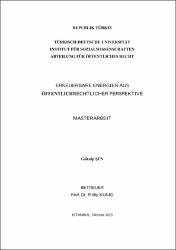| dc.contributor.advisor | Wessels, Wolgang | |
| dc.contributor.author | Alp, Onur | |
| dc.date.accessioned | 2021-01-27T12:40:57Z | |
| dc.date.available | 2021-01-27T12:40:57Z | |
| dc.date.issued | 2020 | en_US |
| dc.date.submitted | 2020 | |
| dc.identifier.citation | Alp, Onur (2020). The role of European Union in Ukraine crisis. Türk-Alman Üniversitesi, Sosyal Bilimler Enstitüsü, İstanbul. | en_US |
| dc.identifier.uri | https://hdl.handle.net/20.500.12846/491 | |
| dc.description.abstract | Ukraine crisis has begun after Vilnius summit in 2013. Ukraine decided not to sign the Association Agreement with European Union, which gave rise to the outbreak of crisis. Since the beginning of it, European Union has become one of the important sides in this crisis, for the crisis had an impact on the both normative and security structure after the cold war. This study investigates the role of European Union, its involvement, and its foreign policy choice such as imposition of sanction, during the crisis. This study’s aim is to demonstrate that how both constructivism and defensive realism explain the European Union’s role in Ukraine crisis. The thesis divided into two part: First part gave an insight into the pre-crisis era to understand what led to the outbreak of crisis. Second part is related to Ukraine crisis. In both parts, theories are examined. Those theories highlight six important points for European Union: Firstly, constructivism identifies three important point how European Union conduct its foreign policy: 1.) Normative position of European Union; 2.) Ideational difference; 3.) Humanitarian aspect. Those three aspect examined through the help of constructivism. Secondly, defensive realisms identifies also three important aspect of European Union’s position: 1.) Security issue; 2.) Intention of Russia and European Union; 3.) Balancing action and defensive realism applicability. Those six point facilitates the analysis of both constructivism and defensive realism in European Union’s role in Ukraine crisis. Moreover, the weaknesses of both theories also presented. To understand European Union’s motivation to involve in Ukraine crisis, the annexation of Crimea and war in Donbass are presented in this study. In this context, Russia and Ukraine’s position, views and relations with European Union are also examined clearly. | en_US |
| dc.language.iso | eng | en_US |
| dc.publisher | Türk-Alman Üniversitesi, Sosyal Bilimler Enstitüsü | en_US |
| dc.rights | info:eu-repo/semantics/openAccess | en_US |
| dc.title | The role of European Union in Ukraine crisis | en_US |
| dc.type | masterThesis | en_US |
| dc.relation.publicationcategory | Tez | en_US |
| dc.contributor.department | TAÜ, Sosyal Bilimler Enstitüsü, Avrupa ve Uluslararası İlişkiler Ana Bilim Dalı Koleksiyonu | en_US |

















